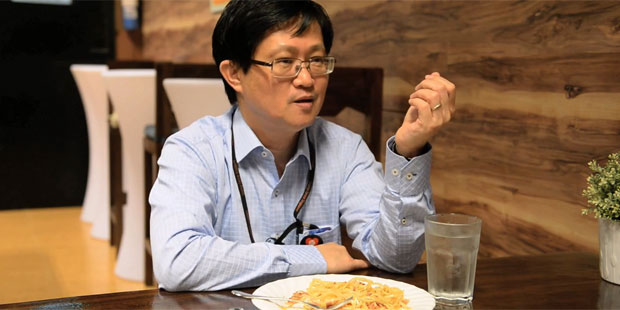Associate Professor Lim Tit Meng is the CEO of Science Centre Singapore.
The 54-year-old recently got into trouble with women feminists, after a weekly internally-circulated letter he wrote to his staff made it into the public sphere and earned him an AWARE Singapore nomination for being sexist.
The letter supposedly showed how a hard science guy belittled women with his choice of words -- questioning if women are a bit too complex for their own good -- even though this could very well have been a typical case of "Think-In-Chinese-Write-In-English" phenomenon, where things don't come out as it is supposed to because Prof Lim is Chinese-educated.
The Straits Times Supper Club conducted an interview with Prof Lim on July 19, 2014, in the wake of the uproar his letter supposedly caused, to set the record straight and hear his side of the story.
And this interview was a hoot to read.
Firstly, it is compelling because it features Prof Lim, the person the public imagines him to be: An easy target for feminists because he is Chinese-educated (read: Male Chauvinist Pig), scientifically-oriented and the quintessential hard-science-guy who wrote a letter that made women angry.
Secondly, ST's Supper Club interviews are usually turgid affairs that feature PAP politicians who don't say anything remotely quote-worthy, except for instances such as this, this and this.
And this is someone going into an interview after already making a bad impression.
The following excerpts below that provide quite a few laugh out loud moments are from the full interview found on Singapolitics here and here.
This is Prof Lim's explanation about how the word "Tit" came about in his name:
Q: What's behind your name then?
I'm Teochew. I asked my late father once why he named all his sons differently. He said: "I look at your face when you're born and I name you from what I see in your face. You had a very smart look so I thought you're going to be chong meng (Teochew for intelligent).
“But I could also sense you may become a bad guy because you may use your intelligence wrongly, so I had to put you on the straight path. So, tik tik (Teochew for straight)."
But why is it t-i-t instead of t-i-k? Because the nurse was Hokkien and "straight" is pronounced tit tit in Hokkien. So that became my English name.
And this is how he had no idea what "tit" really meant until he went to do his doctorate:
Q: Did being Chinese-educated hamper you in other areas of your life?
In the army, I was teased by my platoon mates because in those days, your nametag would reflect whether your first language was Chinese, English, Malay or Tamil.
I had an orange badge but I managed to get into the English platoon in Officer Cadet School, where I mixed with the ACS, RI, St Patrick's boys. They teased me because of my name.
They called me "cheena man" and said, oh, you're tits. Just as well I didn't understand what they were talking about, so it didn't hurt me. I checked the dictionary and found that the tit is a bird, like the blue tit. Okay, I'm a cheena man, I'm a bird, so what?
It was only years later, when I was about to go to England for my PhD, that I realised "tits" had other meanings.
And check out his explanation on how being "Chinese helicopter" hampered his understanding of a nursery rhyme for the longest time:
Q: How old were you then?
Before primary school. When I was 10, we moved to a farm in Lim Chu Kang because my father wanted to grow his fishball business.I went to Chinese schools and studied the sciences in Chinese until my A-Levels. I had to switch to English in Hwa Chong Junior College.
I have four siblings and among us, only my sister, the eldest, was sent to an English school. The rest of us went to Chinese schools. So my English was poor.
My sister came back from school one day and sang us a nursery rhyme: sing a song of sixpence, a pocket full of rye. I thought, what a funny song, sing a song of six pants, pocket put ong lye (Hokkien for pineapple). I never knew the words until I became a father and was in England on sabbatical. All this time, I thought it was just a strange song about ong lye. It made my wife and children laugh like mad.
Top photo via Singapolitics
If you like what you read, follow us on Facebook, Instagram, Twitter and Telegram to get the latest updates.
